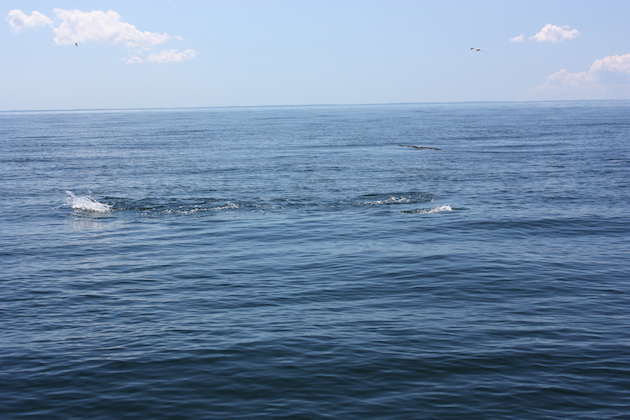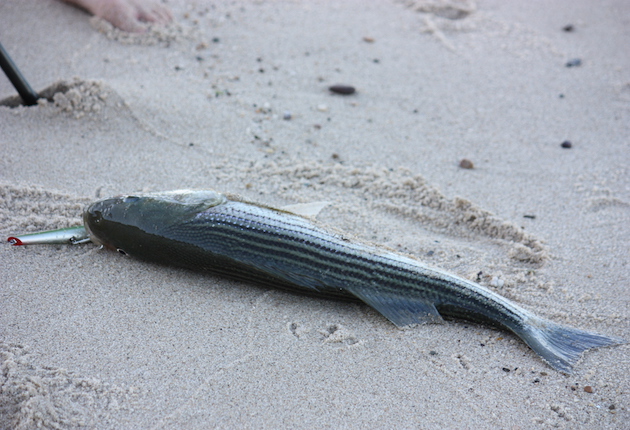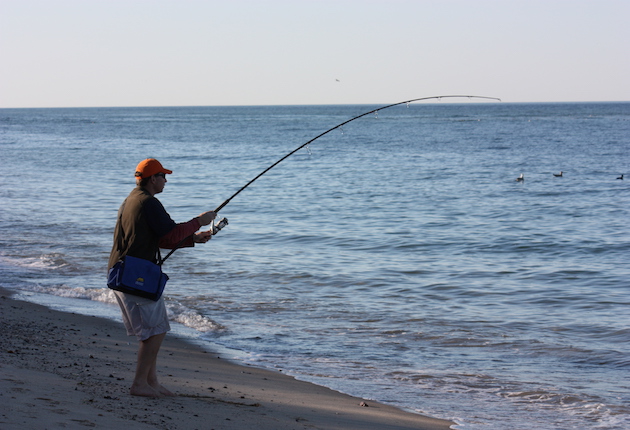There isn’t much like rolling down the dirt roads towards the beach in the fall. It’s warm enough to pull off the doors of my CJ5 but cool enough to leave on the soft top. I unzip the rear window and tie it up so my surf sticks can fit, and worry only when I rumble over a pothole.
On some days I’m nervous that the frame, rusted from a life of hauling boats and running beaches, is just going to snap. It will when it does, but for now . . .
Early one morning about a dozen or so years ago, I dropped the key in the sand. I was fiddle-faddling around with my gear, and by the time I was done I had kicked enough of the loose granular around that it was a lost cause. It’s no matter, for I could insert the flat head of my Swiss Army knife in the ignition, pull the choke, pump the gas peddle a few times, and vroom she goes. In case you’re wondering, there is a knob on the floorboard to the left of my clutch for turning the lights to high.
I parked in the lot, humped over the dunes, and looked out at the beach. The wind blew directly off the ocean, which meant it came from the east. With it came the pungent smell of dried red weed mixed with a briny tang. Summer folks were long gone, so there were no bonfires and grilled burgers and dogs. There were a lot of circling gulls and terns in the air, and then all of a sudden they started to dive.

Sometimes it’s non-stop surface action, sometimes it’s not. Whatever the case, there’s nothing like striper fishing in the surf!
The bowl was full of striped bass turning the surface water white with foam. Far out there was a cluster of seals, horseheads, and harbors, and they were some kind of pissed. The water was too low for them to tear the bass to shreds.
I laughed a bit, for there was a $5 per nose bounty paid on ’em back in the day. That was when fish were everywhere all the time. But since they became protected the blubber multiplied exponentially. They’d have to wait their turn, and with luck the stripers would blow out just before the seals moved in.
I jogged to the water’s edge and saw baitfish washed up above the high-tide line. There were tinker mackerel, bay anchovies, silversides, sandeels, butterfish, and peanut bunker, all pushed on shore by the feeding frenzy. I dropped my gear and plug bags, unhooked a needlefish, and fired it off from way up high on the sand.
I hooked up on the second jerk; it was a bass, a good one. Then another, and another, and another. I was waiting for a legal fish, and when I got one I would take it home for dinner.
I didn’t hear the couple walk up behind me. It was a young man and a young woman. Since I didn’t recognize them, I figured they were from out of town. He looked like he stepped out of a Ralph Lauren catalog, with a sweater tied neatly around his waist. She wore a sundress and carried her sandals. They both smelled sweetly of perfume, and my only problem was I couldn’t tell which one wore which.
“What are you catching?” the young man said.
“Striped bass,” I replied.
“Oh, Bobby, that’s what you had for dinner last night,” she said. “You loved it.”
“It’s a tasty fish for sure,” I said.
With that I pulled a nice fish, maybe 12 or 15 pound,s onto a cresting wave and surfed him onto the beach. It flopped once or twice, and from the look of him he was easily legal. I set my rod next to the fish, and he was a good foot beyond the wind of hockey tape on my blank that charts the right length.
“What are you going to do with him?” the young man asked.
“Well, he’s legal, so I’m going to take him home for dinner. My wife and kids love striped bass.”
“What fun!” the gal said. “Fresh fish. From ocean to table. Can we buy some from you?”
“I’m not a commercial fisherman,” I said, “so I can’t sell you one. But there is more fish than we can eat, so how about I just give you a filet?”
“That’s great,” she said.

Toes in the water, bass in the sand.
I reached in my gear bag and pulled out my knife. I placed the edge against the gills and sliced up to the backbone to bleed it.
“What are you doing?” the woman asked.
“I’m dispatching the fish,” I said. “Killing the fish quickly is the respectful and humane way to treat it. They taste better when they’re bled, too.”
I placed the knife tip in the fish’s vent and set about cleaning it. I tossed the entrails into the water. Crabs need to eat, too.
“That’s disgusting,” she said. “We’ve changed our minds. We don’t want the fish anymore. What you’re doing is sick.”
I shrugged my shoulders. “How do you think the fish you buy at the market gets that way? Or how does a chicken, steak, or pork chop get into those cellophane wrapped packages? How is this any different from what a butcher does?”
Silence.
“It just is,” she finally said.
“How so?”
“I don’t know,” she said. “But what I do know is that what you’re doing is completely different.”
And I knew what she meant. The men in the markets might be a bit faster than me, or they might leave a little less meat on the bones. But I like to leave some meat on the bones because it makes a great chowder stock. From ocean to table . . . whatever that means.

